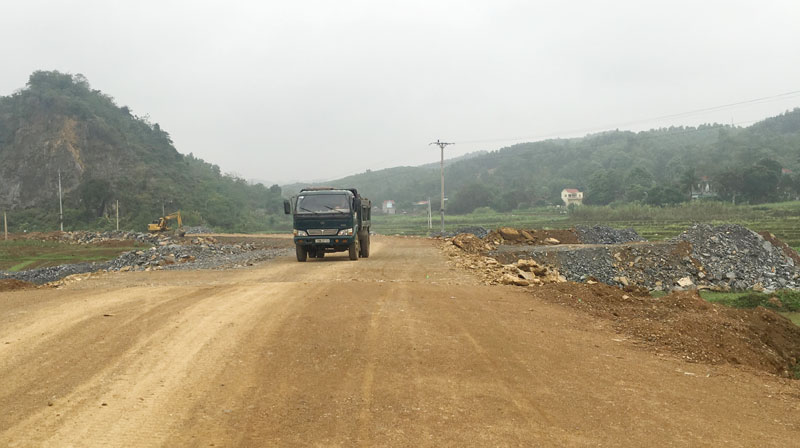
(HBO) - Among the key traffic projects invested by the Department of Transportation, the project of the connecting Ho Chi Minh Road and Highway 12B to National Highway 1 is being urged to speed up the progress.
 By the middle of June 2019, the project connecting Ho Chi
Minh Road and National Road 12B to National Highway 1 was constructed with the
total construction volume of over 37%, trying to complete and reach the set
schedule by the end of this year.
By the middle of June 2019, the project connecting Ho Chi
Minh Road and National Road 12B to National Highway 1 was constructed with the
total construction volume of over 37%, trying to complete and reach the set
schedule by the end of this year.
According to the design scale, the investment project to
build the road with a total length of about 30 km. The starting point of the
route is connected to Ho Chi Minh road at 479 + 300 km in Bao Hieu commune (Yen
Thuy), the end of the route is intersected with Highway 12B at 67 + 100 km,
belonging to Vu Ban town (Lac Son). With a total investment of 250 billion VND,
the road will be upgraded, reaching the road’s standard of grade IV - delta
(TCVN 4054 - 2005) according to the provincial master plan of transport
development. Directly connecting 3 arterial traffic axes in the province, when
completed and put into use, this road will create favorable conditions for
people and vehicles to participate in traffic, effectively contributing to the
local socio-economic development.
According to the evaluation of the Project Management Board
of the Project, by the middle of June 2019, the volume of road embankment was
about 111 thousand m3, reaching 50.23%; the volume of digging the road base was
about 341.5 thousand m3, reaching 68.3%; the volume of the completed
construction was 32/45 horizontal drainage culverts. They completed concrete
casting of decks, railings, handrails for Thuong bridge at 0 + 955.5 km, for My
bridge at 13 + 424,25 km and for Thai bridge 15 + 367.06 km and so on. Up to
now, the construction value has reached over 37% of the total construction
value of the project.
The investors and the Project Management Board have been
actively urging the contractors to focus on mobilizing the human resources, the
machinery, the equipment and materials to speed up the construction progress of
the remaining items, setting the determination to complete the project this
year.
The Standing Board of the Hoa Binh provincial Party Committee has agreed in principle on a proposal by the Standing Board of the Party Committee of Hoa Binh city to gather feedback on the city’s 1:2000 zoning plan, which forms part of its broader urban development strategy.
Hoa Binh province has made notable progress in public administration reform and digital government development, with the satisfaction index among citizens and businesses reaching over 84%, according to recent government evaluations.
Thanks to great efforts by local authorities in recent times, the governance and public administration performance of Mai Chau district has been significantly improved.
In the afternoon of June 6, the Party Committee, the People's Council, the People's Committee and the Fatherland Front of Lac Son district solemnly held a meeting to celebrate the 139th anniversary of the district's founding (1886–2025) and the 79th anniversary of the establishment of the district's Party Committee (1946–2025). There was the attendance of Mr. Bui Van Thang, the Vice Chairman of the Provincial People's Council; Mr. Quach Tat Liem, the Vice Chairman of the Provincial People's Committee; Ms. Dang Bich Ngoc, the Deputy Head of the National Assembly Delegation of the province; as well as the former leaders of the province and district through various periods, who are the natives of the district.
Implementing the Politburo’s Resolution No. 57-NQ/TW on breakthroughs in science – technology, innovation, and digital transformation is a golden opportunity for the northern mountainous province of Hoa Binh to renew growth model, improve competitive edge and shorten digital gap.
Resolution 57-NQ/TW, issued by the Politburo on December 22, 2024, identifies sci-tech, innovation, and digital transformation as strategic breakthroughs to build a developed and prosperous nation. In Hoa Binh province, this spirit is not just a slogan, it’s being put into action through concrete initiatives that form a "new development triangle”: digital citizenship, digital economy, and digital administration.



 By the middle of June 2019, the project connecting Ho Chi
Minh Road and National Road 12B to National Highway 1 was constructed with the
total construction volume of over 37%, trying to complete and reach the set
schedule by the end of this year.
By the middle of June 2019, the project connecting Ho Chi
Minh Road and National Road 12B to National Highway 1 was constructed with the
total construction volume of over 37%, trying to complete and reach the set
schedule by the end of this year.